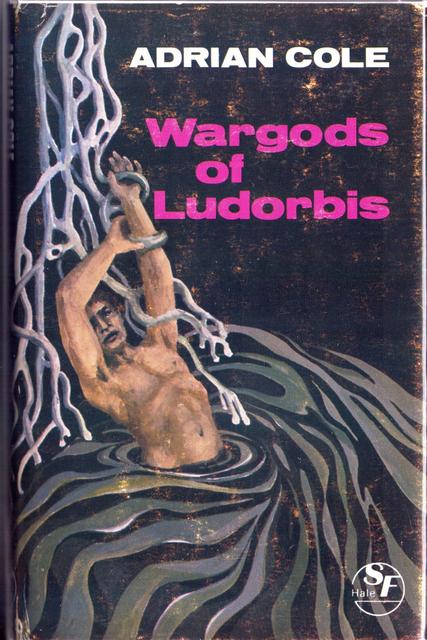

In the far distant future the secret service of an Orwellian interstellar government dispatches its star agent, Special Operations Director Karl Mannish, on a mission to apprehend/eliminate a rogue general named Layhuto. Layhuto has taken refuge on the remote planet of Ludorbis which is strictly off-limits to outsiders and presided over by a mysterious cabal called the Wargods who orchestrate vast conflicts between the planet's competing tribal communities for their own sadistic amusement. In order to accomplish his mission Mannish is forced to adopt the renegade general's own tactic and go native amongst one of the tribal societies. He manages to achieve this without too much difficulty, on account of his prodigious physical strength, but escaping the attentions of the omnipotent Wargods is easier said than done; especially when one is a white man embedded in - what the dustwrapper describes with blunt 80s insensitivity - "a ferocious tribe of negro killers". His problems are compounded by the presence of an off-world white woman called Ara, and the subsequent arrival of a revengeful assassin called Sperago looking to salvage his reputation for having failed to kill Layhuto on a previous occasion.
Mannish's pursuit of Layhuto takes him into the savage combat tournament of
Obomba, through monster infested caverns and finally into the citadel of the Wargods themselves. Here he finally learns the unedifying truth about them. Without wishing to spoil anything I expected him to find that the Wargods didn't exist or, in true Star Trek fashion, turn out to be some redundant computer simulation that was still running. The reality turns out to be far more prosaic.
Adrian Cole is unquestionably one of the finest practitioners of fantasy working today. For some reason though he has never accrued the popular recognition that his work deserves. Whether this is due to the fact that he has never hitherto been that prolific owing to having held down a regular job up until his recent retirement, or a lack of luck with publishers not properly appreciating and promoting him is difficult to gauge.
What is beyond dispute is that Cole has always had a tremendous interest in and enthusiasm for a wide variety of popular culture, ranging from pulp magazines to comics to old tv shows, and has long had a playful relish for incorporating these varied interests into his work. That said I doubt if any other of his books wears its influences and inspirations quite so heavily as
WARGODS OF LUDORBIS. The basic premise is an amalgam of Coppola's
Apocalypse Now and the old Pat Troughton
Doctor Who serial "The War Games". Add a protagonist clearly modelled on Tarzan, and a setting plucked from Haggard with additional trimmings courtesy of Howard, stir in a dash of
Logan's Run and a pinch of Bond and you have a recipe for a very strange confectionary indeed.
Contrary to expectations though these contrasting elements actually chime with one another remarkably well.
Some of the characterization however is all over the place. In the space of a single paragraph Controller Overhein goes from being an ex-field man who "chewed up the 'rookies' for spite" to someone whose "nerves usually failed him". This though is as nothing compared to the treatment meted out to Ara who goes from being a haughty bitch-goddess to a stroppy slut, then a servile besotted wench to a whiney damsel-in-distress, before the wheel once again turns full circle. Her back story is equally inconsistent leaving one with the impression that Cole was never really sure what her role in the story actually amounted to, other than to be decorative.
The book also has a very ungainly structure to it: a (very) heavy info dump in the first chapter and a rash of gabbled explanations in the last. And inbetween the two a furiously paced sequence of facile adventures. It certainly isn't unenjoyable by any stretch of the imagination but one is left feeling that Cole was writing well within himself whilst he was working on it. The sex is very discreet and the action far from graphic despite the violence of the scenario. One is tempted to apportion the blame for this to the restraining hand of the publisher, what with it being so at odds with Cole's natural style.
WARGODS OF LUDORBIS is one of a handful of obscure, and mostly unreprinted, books that Cole produced for Robert Hale around the turn of the 1980s. Hale remains primarily a supplier of public library stock to this day and has never been in the business of conciously offending anyone.
I suspect that were the book ever to be reprinted - which seems increasingly unlikely in our more racially sensitive age - then Cole would take the opportunity to drastically rewrite it. As it stands it is a curio seen in the wider context of Cole's career; one every bit as symptomatic of its time, in its own way, as packets of Frazzles and bottles of Cresta.
![]()